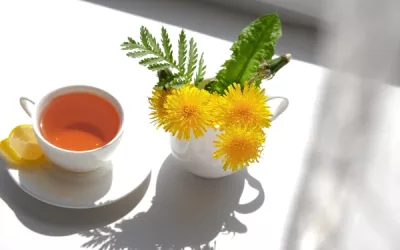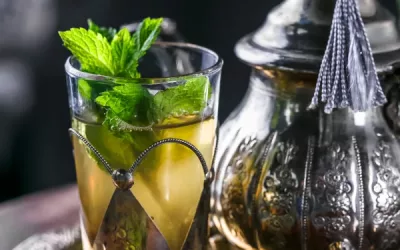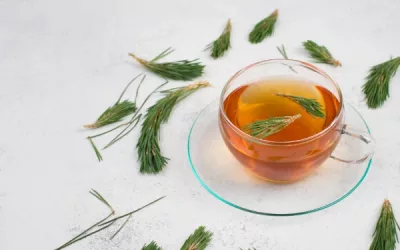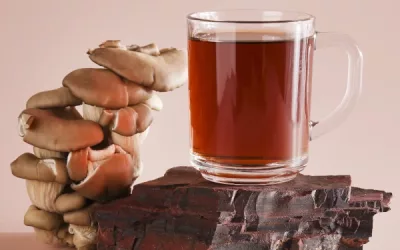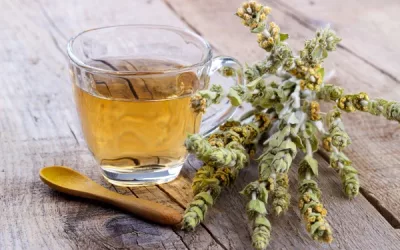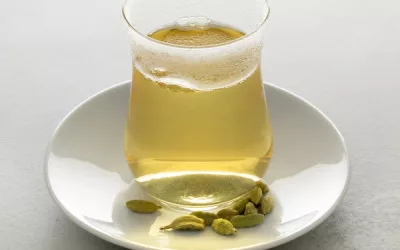Have you ever paused to consider the endless variety of herbal teas, each steeped in tradition and health benefits? From ancient remedies to modern wellness routines, herbal tea offers a rich tapestry of flavours and healing properties. Understanding its significance not only enhances your tea experience but also empowers you to make informed choices for your health. This guide delves into the history, types, preparation methods, and health benefits of herbal tea, helping you unlock the secrets of this natural elixir for a healthier lifestyle.
Table of Content
- What is herbal tea (tisane)?
- What Is Herbal Teas History?
- What are the different types of herbal tea?
- How do you prepare herbal tea?
- What are the health benefits of herbal tea?
- Are there any cautions or interactions associated with herbal tea?
- How can you choose the right herbal tea for your needs?
- How can you incorporate herbal tea into your daily routine?
- Conclusion
What is herbal tea (tisane)?
Herbal tea, also known as tisane, is a drink made by infusing herbs, spices, flowers, or other plant parts in hot water. Unlike regular tea, which comes from tea leaves like black or green tea, herbal tea does not contain any tea leaves and is usually free of caffeine. Herbal teas are enjoyed for their flavors and potential health benefits, making them a popular choice for promoting wellness and relaxation.
What Defines Tisane?
Herbal tea, also known as tisane, is distinct from traditional tea because it doesn’t come from the Camellia sinensis plant. Instead, it’s made from a variety of dried fruits, flowers, spices, herbs, and other plant materials.
- It’s caffeine-free, which makes it suitable for relaxation at any time of day.
- The ingredients can range from common kitchen herbs to exotic botanicals.
- Each type offers unique flavours and benefits.
- People often brew it to get health benefits, such as improved digestion, better sleep, and enhanced immunity.
- It’s prepared by steeping plant materials in hot water, much like traditional tea.
You might think of herbal tea as just another drink, but its roots go deep. Historic records show that people revered herbal teas for their healing properties. Ancient Egyptians used chamomile for its soothing characteristics.
Traditional Chinese medicine often incorporates various herbs to balance the body’s energies. Greeks utilised mint and sage to calm digestive issues. Each culture lent its unique twist, which shaped how we perceive and enjoy herbal teas today.
What Is Herbal Teas History?
Herbal tea has a long and fascinating background, extending over thousands of years and multiple cultures. Known for being a soothing, non-caffeinated drink, herbal tea encompasses a wide range of flavours and benefits. Ancient civilizations like Egypt, China, and Greece used these teas not just for pleasure but also for their medicinal properties. Over time, herbal tea has evolved, becoming an essential element in numerous cultural practices and wellness regimes.
Whether it’s chamomile for relaxation or peppermint for digestion, herbal teas continue to captivate people worldwide. They often serve as delightful alternatives to caffeinated beverages, and their natural properties have made them staples in natural medicine.
How Has Herbal Tea Been Used Historically?
Herbal tea played many roles throughout history, often doubling as both a beverage and a remedy.
- Ancient Egyptians used herbs like chamomile and peppermint for both ritualistic and medicinal purposes.
- Traditional Chinese medicine frequently uses herbal teas to treat ailments and improve overall well-being.
- In ancient Greece, herbs such as thyme and sage were common in everyday use for their therapeutic effects.
- Native Americans often brewed herbal infusions for healing purposes, considering plants like nettles and elderflowers to be sacred.
- European monks in the Middle Ages cultivated herb gardens to create teas that could treat various ailments.
These early uses have significant overlaps with what we recognise today as herbal therapies. Ingredients like ginger for nausea, eucalyptus for colds, or lavender for stress are still prevalent. Herbalists and wellness practitioners often trace their knowledge back to these ancient practices.
What Are Some Cultural Significances Of Herbal Tea?
Herbal teas also hold a special place in several cultures, each adding to their rich narrative.
- In China, tea ceremonies often include herbal teas, seen as balancing agents.
- Native American traditions regard certain herbs as sacred, incorporating them into spiritual practices.
- In India, Ayurveda uses various herbal decoctions for balancing mind and body.
- Middle Eastern cultures use herbs like mint and hibiscus in both daily life and ceremonial settings.
- European culture often associates certain herbal brews with therapeutic and wellness routines.
These cultural connections offer more than a beverage; they invite participants into a shared history, a ritual, and a moment of peace. Imagine sipping a cup of chamomile tea and feeling an age-old practice wash over you, providing comfort and continuity.
What are the different types of herbal tea?
Herbal tea isn’t just one single type of drink. You can explore different varieties that come with their unique flavours, ingredients, and benefits. If you’ve always stuck to traditional black or green tea, you’re in for a treat. Below, I’ve created a table with some popular types of herbal tea. Each row breaks down the name, key ingredients, main benefits, flavour notes, and how they’re traditionally used. This will help you get a good grasp on what each one offers so you can pick the best fit for your tastes and needs.
Here’s a guide to understanding the table:
- Name: The type of herbal tea
- Ingredients: The main components used in making the tea
- Benefits: Key health benefits associated with each type
- Flavour: The primary taste profile
- Uses: Traditional applications or why people drink this type of tea
| Name | Ingredients | Benefits | Flavour | Uses |
|---|---|---|---|---|
| Chamomile | Dried chamomile flowers | Helps with sleep, reduces anxiety | Floral, apple-like | Relaxation, improving digestion |
| Peppermint | Peppermint leaves | Aids digestion, relieves headaches | Minty, refreshing | Stomach aches, headaches |
| Ginger | Fresh or dried ginger | Anti-inflammatory, aids digestion | Spicy, sharp | Nausea, cold symptoms |
| Rooibos | Rooibos plant leaves | High in antioxidants, supports heart health | Sweet, nutty | General wellness, immune support |
| Hibiscus | Hibiscus flower petals | Lowers blood pressure, rich in vitamin C | Tart, cranberry-like | Blood pressure management, cooling down |
| Lemongrass | Lemongrass stalks | Detoxifying, anti-bacterial | Citrus, lemony | Digestion, reducing inflammation |
| Echinacea | Echinacea plant parts | Boosts immune system, fights infections | Earthy, herbal | Cold and flu prevention, immune health |
Herbal teas come from various parts of plants, such as leaves, seeds, roots, or flowers. Each one is unique in its own way, not just in flavour but also in the benefits you can get from drinking them.
What are the benefits of drinking herbal tea?
Herbal teas are celebrated for their range of health advantages. Many people turn to herbal teas as an alternative to sugary drinks and caffeine-heavy options. Here are some of the core benefits you might find intriguing:
- Supports digestion: Many herbal teas, such as peppermint and ginger, are known to aid digestion and alleviate stomach discomfort.
- Boosts immune system: Types like echinacea and rooibos contain properties that can strengthen your immune defences.
- Reduces inflammation: Several herbal teas have anti-inflammatory properties, especially ginger and lemongrass.
- Promotes relaxation: Chamomile and peppermint are renowned for their calming effects.
- Improves heart health: Some herbal options, like rooibos, are high in antioxidants that promote heart health.
- Rich in vitamins and minerals: Many herbal teas contain a mix of essential vitamins and minerals that contribute to overall well-being.
Drinking herbal tea can be a wholesome part of your daily routine. Enjoying a warm cup in the evening, for example, makes a lovely ritual that can also provide stress relief and a bit of mindfulness.
How to prepare and enjoy herbal tea?
Preparing herbal tea isn’t complicated, but the method you use can affect the flavour and benefits you get from it. Let’s walk through the steps:
- Choose your herbal tea: Pick the type that suits your current needs.
- Boil fresh water: Use filtered water for the best taste.
- Measure the tea: Use about a teaspoon of loose leaves or one tea bag per cup of water.
- Steep properly: Steep the tea according to its type, usually between 5-10 minutes. Longer steeping can bring out stronger flavours.
- Add extras: Optional – add honey, lemon, or spices for extra flair.
- Sip and enjoy: Drink it while it’s warm for maximum comfort and benefit.
Prepping herbal tea is all about developing a personal routine that you look forward to. Each cup can be a small escape from the busy hustle, offering a moment of peace.
During the Second World War, soldiers often used herbal remedies as part of their makeshift medical kits. Echinacea, in particular, was a common natural remedy.
With pharmaceutical options being scarce, troops utilised this plant to boost their immune system and fight off infections. Its usage became widespread among the soldiers, showing the enduring reliability of traditional healing methods even in modern conflicts.
I remember my first encounter with herbal tea during my university years. A friend introduced me to chamomile tea when I was buried under a mountain of assignments and stressed out.
At first, I was sceptical, but the calming floral scent won me over. Since then, it has become my nightly ritual to wind down before bed. Chamomile’s soothing properties really helped me get through those stressful times, and I’ve been hooked ever since.
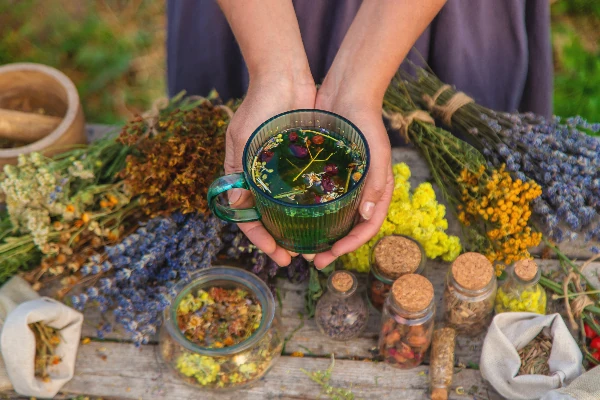
How do you prepare herbal tea?
So, you want to prepare herbal tea? Well, you’re in for a real treat because there are more ways to brew it than people who say “Namaste” at yoga classes. Let’s break this down, shall we?
What are the different methods for preparing herbal tea?
First up, there are several ways to make herbal tea, and each has its own quirks.
Infusion Method
This is the classic route. You basically treat the herbs like a spa day—steeping them in hot water until they’ve given up all their goodness. It’s perfect for leaves, flowers, and other delicate parts of the plant. Just boil some water, pour it over the herbs, and let it sit for 5-10 minutes. Voilà, your herbal concoction is ready!
Decoction Method
Now, if you’re dealing with tougher customers like roots, barks, or non-compliant seeds that are as stubborn as an old mule, you’ll need the decoction method. Here, you simmer the herbs in water for about 20-30 minutes. Think of it as a more assertive interrogation, coaxing out those hard-to-get nutrients and flavours.
Cold Brew Method
Feeling fancy? Try the cold brew method. This one’s simple—toss your herbs in cold water and let it sit in the fridge for 4-12 hours. It’s like the slow cooker of tea-making: low and slow. This method is great for hot days when you want something refreshing without waiting for your kettle to whistle.
How does the preparation method affect the flavour and benefits?
Different strokes for different folks, right? The way you prepare your herbal tea can seriously change its flavour profile and benefits.
- Infusion Method: The gentle approach helps keep the subtle flavours intact, perfect for lighter herbs like chamomile or mint. Plus, you get a nice boost of vitamins and aromatic compounds.
- Decoction Method: This is your go-to for earthy, robust flavours. Roots and barks release more of their medicinal properties when simmered, making it ideal for teas targeting health issues like colds or digestive problems.
- Cold Brew Method: Expect a milder, sweeter taste. The slow extraction reduces bitterness, preserving the delicate nuances of the herbs. It’s less potent in terms of immediate impact but still good for hydration and subtle benefits.
What are some tips for making the perfect cup of herbal tea?
Now, let’s get down to the nitty-gritty of making that perfect cup. Whether you’re a seasoned tea connoisseur or a newbie, these tips will have you brewing like a pro.
- Quality Matters: Always opt for high-quality, organic herbs. The fresher, the better.
- Proper Steeping: Don’t let your tea get all bitter! Stick to the optimal steeping times: 5-10 minutes for infusions, 20-30 minutes for decoctions, and 4-12 hours for cold brew.
- Boost the Flavour: Add a splash of lemon, a dab of honey, or even a pinch of cinnamon. Spice things up!
- Use Fresh Water: Start with fresh, cold water to avoid any lingering aftertastes from previously boiled water.
- Experiment: Create your own blends! Mix and match herbs to find your signature brew.
Lastly, get to know your herbs. Every plant has a story and benefits waiting to be unlocked. But remember, not all herbs play nice together; some might turn your tea party into a disaster zone.
Back in the 18th century, sailors would carry ginger root during long voyages. They discovered that boiling or steeping it made a tea that helped combat scurvy and seasickness—though probably not at the same time. This early form of herbal tea wasn’t just refreshing; it was literally a lifesaver.
So, grab your kettle or cold brew pitcher and start experimenting. Herbal tea is both an art and a science—a delightful blend of nature’s best, served up just the way you like it.
What are the health benefits of herbal tea?
Let’s dive in. Herbal tea isn’t just something you sip when you’re feeling fancy or pretending to be healthy. It’s got some actual, science-backed benefits. No fluff, just facts.
Herbal tea is like nature’s multivitamin: it’s packed with herbs, roots, flowers and spices that do wonders for the body. Whether you’re looking to chill out, boost your digestion, sleep like a baby, or harness some of nature’s antioxidants, there’s an herbal brew for you.
How can herbal tea help reduce stress?
Right, let’s get into why herbal tea is your new BFF when stress starts knocking at your door.
Much like how a good cat video can instantly elevate your mood, a warm cup of herbal tea works its magic too. Ingredients typically used in these teas, such as chamomile, lavender, and peppermint, have natural compounds that can help calm your mind and relax your body.
- Chamomile: This classic herb contains apigenin, an antioxidant that binds to brain receptors—providing a somewhat magical calming effect.
- Lavender: The scent of lavender alone is enough to zen you out, but drinking it amplifies the relaxation.
- Peppermint: The menthol in peppermint relaxes muscles and relieves tension headaches.
- Rooibos: South African red tea that’s caffeine-free and full of theurapeutic properties.
- Lemon Balm: Not just a pretty name, it’s also good for reducing anxiety and improving mood.
When you’re frazzled, a cup of herbal tea isn’t just a placebo. It’s loaded with natural stress-busters that work from the inside out.
What are the benefits of herbal tea for digestion?
Next stop on the herbal tea train: digestion station!
If your stomach is rebelling after a hearty meal, herbal tea comes to the rescue. It’s like the digestive superhero in your pantry, with herbs that help soothe and balance your gastrointestinal system.
- Ginger: The king of digestion! It reduces nausea, fights bloating, and speeds up the digestion process.
- Peppermint: This multitasker also eases digestive issues by calming the muscles of the digestive tract.
- Fennel: Great for reducing gas and bloating—think of it as a natural antacid.
- Dandelion: Helps detoxify and support liver function, which in turn aids digestion.
- Licorice Root: Not the candy, but the herbal stuff which helps reduce inflammation in the digestive system.
When your tummy’s doing flips, herbal tea can ease discomfort and help things run smoothly, minus the side effects of over-the-counter meds.
How does herbal tea support the immune system?
Onward to the immune system—your body’s personal bouncer.
Herbal tea can give your immune system a much-needed assist, particularly when the seasons change and germs seem to be everywhere. Packed with natural antiviral and antibacterial compounds, herbal tea has properties that can bolster your defences against illnesses.
- Echinacea: A go-to for speeding up recovery from colds and flu.
- Elderberry: Rich in antioxidants and vitamins that improve immune health.
- Ginger: It’s not just good for digestion—it’s also anti-inflammatory and can help fight infections.
- Turmeric: Contains curcumin, which has powerful antioxidant and anti-inflammatory effects.
- Rosehip: Chock-full of vitamin C, helping strengthen your system and shorten the duration of colds.
When the sniffles hit, make herbal tea your go-to. It’s a delicious way to turbocharge your immune system naturally.
Now, did you know that the Queen of England herself, Queen Victoria, was a fan of herbal remedies? Back in the 19th century, she popularised pennyroyal tea, believed to have antispasmodic properties. This herbal concoction was used to manage bouts of indigestion after the grand feasts held at royal gatherings. Perhaps if she’d been faced with today’s stressors, she’d be relaxing with a cup of chamomile too!
Are there any cautions or interactions associated with herbal tea?
Herbal tea might seem like the perfect elixir – it’s natural, refreshing, and has a wholesome vibe. But hold your tambourines, because there are definitely some red flags you should be aware of.
There’s more to decipher here than meets the eye, including potential side effects, medication interactions, and who should back away slowly from that herbaceous brew. Trust me when I say, ignorance is not bliss when it comes to herbal tea.
The discussion is essential whether you’re a health-conscious individual, a tea aficionado, or keen on traditional medicine. So, let’s dive in with eyes wide open and tongues ready for a splash of herbal wisdom.
What are the potential side effects of herbal tea?
Herbal tea isn’t always the kindest mate you’ll meet. While some blends promise tranquillity and health, others come with baggage – potential side effects that aren’t always just trivial boo-boos.
- Allergic Reactions: Itching, swelling, or even a full-blown hives situation aren’t exactly what you’d sign up for over a cup of tea, right?
- Gastrointestinal Issues: Projectile vomiting, nausea, or the dreaded diarrhoea may sometimes follow certain herbal brews, looking at you Senna.
- Changes in Blood Pressure: Herbal teas like Liquorice root can hike up blood pressure, delivering more anxiety than calm.
- Liver Damage: Kava tea takers listen up; liver damage isn’t too far off with regular or wrong usage.
- Photosensitivity: St. John’s Wort can turn you into a vampire, making you dread sunlight like a ‘Twilight’ character.
So, while your herbal tea might look like a flower power concoction, in reality, it might be concocting trouble inside you.
Can herbal tea interact with medications?
Herbal tea might be the sneaky saboteur working against your meds. Combining the two without a second thought may lead to unwelcome drama in your health saga.
- Anticoagulants: Herbal teas like Chamomile or Ginkgo Biloba can amplify the effects of blood thinners, leading to a higher risk of bleeding.
- Anti-Anxiety Medications: Taking Valerian root herbal tea? Proceed with caution if you’re also on anti-anxiety meds; sedation alert!
- Blood Pressure Meds: Got Hypotension? People on blood pressure meds pairing them with Peppermint tea might see decreased effectiveness.
- Diuretics: Hibiscus tea has diuretic properties, which can potentially tangle with your prescription, either duplicating or reducing the effects.
- Thyroid Meds: If you’re a Licorice fan, ease off if you’re on thyroid medications—two thumbs down from your Endocrinologist.
Always think twice before mixing – it’s better to consult your doctor or pharmacist than to face a pharmacological fiasco.
Who should avoid drinking herbal tea?
Herbal tea may not be everyone’s cup of tea – pun intended. Some should just say cheers and move on to a safer alternative.
- Pregnant Women: Some herbal teas could induce uterine contractions. Raspberry Leaf, you’re out.
- Breastfeeding Mothers: Some herbs can affect milk production or transfer unwanted compounds to the baby.
- Children: Their developing systems might react unpredictably to certain herbs.
- Individuals with Autoimmune Disorders: Alfalfa tea can exacerbate symptoms because it contains L-canavanine.
- People Scheduled for Surgery: Some herbal teas can interact with anaesthesia or bleeding control.
If you fall into one of these categories, put that fancy teapot away and avoid unnecessary risk.
Back in 2737 BC, legend has it that Emperor Shennong of China was boiling water when some leaves from a nearby tree blew into his pot. Intrigued by the aroma, he took a sip and voila! Tea was born.
Fast forward a few centuries and that simple happenstance has blossomed into an intricate world of herbal brews. While Emperor Shen Nong supposedly died from an overdose of toxic herbs, let’s not follow in his footsteps.
Choosing the right herbal tea involves wisdom, caution, and a dash of prudence. Your health, your choice – just make it an informed one!
How can you choose the right herbal tea for your needs?
Picking the perfect herbal tea isn’t just a random plunge into the tea aisle. It’s more like matchmaking, but for your taste buds and health. So, buckle up, tea enthusiast! We’re about to dive into the aromatic world of herbal teas and how to find the perfect brew for your needs.
First, you need to strip down your health goals and taste preferences. Are you aiming to calm those nerves, boost your immune system, or perhaps aid digestion? Then, of course, there’s a taste. Do you like it minty, floral, or maybe spicy?
Once you’ve cracked that code, it’s time to investigate the benefits of different herbs. Not every herb is created equal – some are stars at fighting colds, others are pros at reducing stress. Read up, take notes, and don’t shy away from asking experts. This can be a real game-changer in finding your perfect cup.
If you’re feeling overwhelmed, have a sit-down with healthcare providers. They can guide you through potential allergies, interactions with any meds you’re popping, and even direct you to specific herbs that align with your health goals. Last but not least, don’t forget to explore different brands. Every brand brings a unique twist, and quality can vary. So, sip around and find your favourite.
What factors should you consider when choosing an herbal tea?
Alright, Sherlock, let’s break this down. Choosing the right herbal tea isn’t rocket science, but you do need to think about a bunch of things:
- Health Goals: Figure out what you want. Like, do you need to de-stress, detox, or improve your digestion?
- Flavour Preferences: A tea might be great for your health, but if it tastes like a sock, you’re not going to drink it. Find something you’ll actually enjoy sipping.
- Specific Benefits: Do your homework on what each herb can do. Chamomile for calming? Peppermint for digestion? You get the drift.
- Consult Healthcare Providers: Especially if you’re on meds or have health issues. They can warn you about any nasty side effects.
- Brand Exploration: Not all brands are created equal. Some might load their teas with unnecessary junk. Look for quality and transparency in ingredients.
Considering these factors will help you pin down that perfect herbal tea blend which fits snugly into your lifestyle without any nasty surprises.
How can you match herbal tea to your health goals?
Matching herbal tea to your health goals is as straightforward as a kick in the pants. It’s all about picking the right herb for the job.
- Chamomile: Stress and insomnia’s worst enemy.
- Peppermint: For those digestion issues that make you regret every meal.
- Ginger: The go-to for nauseous moments or to boost your immune system.
- Lavender: To calm the nerves and relax your muscles.
- Rooibos: Packed with antioxidants if you’re looking to detox and boost overall health.
And remember, it’s not just about the primary benefit. Some herbs pack multiple advantages. The point is, whatever your health issue, a corresponding herb with the necessary skills is ready to kick in.
Why is it important to consult with healthcare providers before choosing an herbal tea?
Now, don’t go rogue with your herbal tea choices. Consulting healthcare providers is not optional; it’s crucial. Why? Well, let’s look at why this is serious business:
- Allergies: Some herbs might trigger allergies you didn’t know you had.
- Interactions with Medications: Herbal teas can mess around with your meds, reducing effectiveness or causing side effects.
- Underlying Conditions: Certain herbs could aggravate current health issues.
- Proper Guidance: They can guide you towards beneficial options specific to your condition.
- Dosage: Get pointers on how much you should actually ingrain into your daily diet.
So, take the safe route. A quick consultation can save you from a potentially awkward ER visit.
Once upon a time, during World War I, when medicine was in short supply, herbal teas came to the rescue. Soldiers suffering from dysentery found relief by sipping on raspberry leaf tea, as it had astringent properties known to soothe intestinal issues. This little herbal hero played a part in keeping troops in the fight, showing us that sometimes, old-school remedies can still pack a punch. So next time you’re considering that herbal cuppa, remember: it has a history of getting the job done. Sip wisely!
How can you incorporate herbal tea into your daily routine?
Let’s be honest. Herbal tea isn’t just for your grandma or that one friend who lives at the yoga studio. It’s a versatile, delicious addition that can slide seamlessly into your day-to-day hustle. You don’t need to wear hemp clothing or recite mantras (unless you’re into that, no judgment here). So, how do you make this herbal elixir a staple? Let’s break it down.
Imagine kick-starting your day with a rejuvenating cup, giving yourself a mid-afternoon boost when you’re ready to face-plant into your keyboard, and winding down at night with a calming brew. Pair it with meals or get creative in the kitchen—herbal tea isn’t just versatile; it’s transformative.
How can herbal tea be part of a morning ritual?
Rise and shine! Forget the standard coffee routine that’s more jittery than a squirrel on Red Bull. Swap it out for something that’s kinder to your system and equally invigorating.
- Wake-Up Call: Try a cup of peppermint tea. It’s naturally caffeine-free but still packs a punch to wake you up with a minty freshness.
- Detox Dream: Kickstart your metabolism with a cup of lemon and ginger tea. It’s like a gentle nudge for your digestive system.
- Zen Master: For those needing a calm start, chamomile or lavender can keep you serene as you plot world domination.
- Vitamin Boost: A good herbal tea can load you with antioxidants and vitamins. Hibiscus tea is rich in Vitamin C, giving you that immune system pick-me-up.
- Custom Concoction: Create your own mix: green tea with a peppermint twist or rooibos with a splash of lemon.
Making herbal tea part of your morning ritual doesn’t require you to overhaul your life. You just steep, sip, and feel superior to your old coffee-slugging self.
What are some ways to use herbal tea as an afternoon pick-me-up?
Okay, it’s 3 PM, you’re tired, and there’s no way another cup of coffee will help—unless your goal is jittery hands and a sleepless night. Enter herbal tea, your natural savior.
- Energy Boost: Ginseng tea is your new best friend. It’s like a gentle kick but without the crash.
- Mind Freshener: Try a cup of rosemary or spearmint tea. Both can help to sharpen your focus.
- Mood Lifter: Feeling the midday blues? St. John’s Wort tea can be uplifting.
- Hydrate: It’s not just about the boost; herbal teas like nettle or dandelion provide hydration and essential minerals.
- Pair and Snack: Match your tea with a healthy snack—nuts, fruits, or a bit of dark chocolate can be the perfect pairing.
Using herbal tea as an afternoon pick-me-up is an act of self-love. It’s like whispering to yourself, “Hey, we got this,” without the caffeine-induced insanity.
How can herbal tea enhance evening relaxation?
Finally, the day’s done. Time to let your hair down (or not), get cozy, and decompress with some herbal goodness.
- Sleep Easy: Chamomile and valerian root are the OGs of bedtime teas. They’re natural tranquilizers without the sketchy side effects.
- Digestive Aid: Had a heavy dinner? Peppermint or fennel tea can aid digestion and reduce bloating.
- Stress Relief: Lemon balm or ashwagandha teas are great for reducing anxiety and preparing you for sweet dreams.
- Decadent Sips: Make it fancy. Add a spoonful of honey, a slice of lemon, or a sprig of fresh herbs.
- Ritual: Create a nightly routine. Reading a book? Watching your favourite show? A cup of herbal tea can be the perfect companion.
Enhancing evening relaxation with herbal tea isn’t just about drinking a warm beverage. It’s about creating a small, delightful evening ritual that helps you decompress and prepare for restful sleep.
Back in the day, Pythagoras, yes, that triangle guy, was a big fan of herbs and their medicinal properties. It’s said that he wasn’t just a numbers geek; he advocated for a holistic approach in life.
He believed in the power of both mental and physical health, heavily relying on herbal remedies like tea for medicinal and relaxation purposes. So, when you’re sipping that calming chamomile in the evening, just know you’re kind of following in the footsteps of a legendary mathematician. Cheers to that!
Conclusion
As I reflect on the journey through the world of herbal tea, it’s clear that this ancient beverage transcends mere refreshment. From its storied history steeped in cultural significance to its diverse varieties that cater to personal health and taste preferences, herbal tea has evolved into an essential facet of natural wellness.
The myriad health benefits it offers—such as stress alleviation, improved digestion, and immune support—underscore the importance of integrating these herbal infusions into our daily lives.
It’s not just about enjoying a warm cup; it’s about embracing a lifestyle that values mindful consumption and holistic health. With thoughtful consideration for individual health goals and desires, selecting the right herbal tea can be a rewarding experience, one that empowers us to take control of our wellness.
Moreover, being aware of potential side effects and consulting with healthcare professionals adds an important layer of safety to our herbal adventures.
If we consider the role of herbal tea in our routines, it becomes evident that it can enhance our lives in countless ways. Whether it’s a calming cup to end the day or an energising blend to kickstart the morning, herbal tea has a place in every moment of our lives.
As I conclude this guide, I invite you to reflect upon this: When was the last time you took a moment for yourself, to pause, sip, and appreciate the wonder of herbal tea?
In a world racing forward, perhaps we can all benefit from slowing down to enjoy the simple, nourishing rituals that herbal tea offers. After all, as the saying goes, “Tea is the magic key to the vault where my brain is kept.” What will you unlock today?
Resources
- Herbal Teas and their Health Benefits: A Scoping Review
- Tea and Herbal Infusions, Psychological Stress, Anxiety & Sleep Health: A Systematic Review of Human Trials & Mechanistic Studies
- Interaction of herbal products with prescribed medications: A review
- Role of Herbal Teas in Regulating Cellular Homeostasis and Autophagy
- 5 Teas to Lower Blood Pressure | Healthline
- Immunomodulatory effects of selected medicinal herbs and their essential oils
- Health Benefits of Tea – Herbal Medicine
- Herbal infusions and health: A review of findings from human studies
- Medicinal Uses for Herbal Teas: Evidence, Dosing, and Preparation Methods
- 10 Healthy Herbal Teas You Should Try


